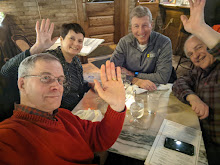As my mother in law's Alzheimer's progressed in the last few years, I never quite resolved a nagging question as the neurons continued to go silent, taking not only memories with them, but the filters that mask a side of people we may not have previously seen: Am I seeing what is part of a person or just the symptoms of an illness?
Oralie Thurston was as proper a Yankee as New England ever produced, a kind and thoughtful woman whose partnership with her husband, Don, set a standard in faithfulness and love; a woman who loved her church before it closed, wrote an endless convoy of notes and letters to friends and loved ones, and volunteered at the local hospital so a little less horribleness could infiltrate the lives of people in her northern Berkshire County on their terrible days. She was generous and kind and if you didn't know any better, you might think her a bit of a pushover.
You didn't want to disappoint Oralie, a daughter of Vermont's Northeast Kingdom. A withering glance or other hint of disapproval could make a person wonder if he had an ounce of goodness himself.
 |
| Walking into the hospital room in White Plains the day after Sean was born in 1985. |
Because she didn't have 40 hours in being an "FM disc jockey" (back then, being such a thing was the epitome of "cool"), the bosses made her help out in the newsroom, where she became the first of dozens -- hundreds, really -- of people in the radio business to experience my ability to be a dickhead, at least where news is concerned. And yet, she persisted.
We were a close group, those night people at the station, and we had our minimum wage fun. I'd sit in her studio from time to time to chat with her during her long album sets, and awhile after my then wife (the "marital mulligan" I call her) decided to have an affair with her boss and announce my role was no longer needed, we became a couple.
 |
| Oralie Lane and Donald Thurston |
I'm not sure Carolie, who by then was working at a radio station in Middletown, Conn., ever told her mom that when she'd drive up to to visit her in Clarksburg on Saturdays, it was only after spending Friday night at my place in Cheshire, Mass. Oralie wasn't the type to like that sort of thing. Besides, there was another problem: I was divorced, or at least soon to be.
I suspect, whether she acknowledged it or not, this was a significant concern for Oralie when it was finally revealed that Carolie was dating a divorced guy she hadn't yet met. But as the story goes, when Carolie tells it anyway, one evening during conversation about it, Oralie said, "you love him?"
And when Carolie said "yes", that was that. She trusted her -- as much as a mother is allowed to trust the romantic adventures of a daughter.
I don't remember the first time I met Oralie or the equally friendly, if intimidating, Don. But I know I was met at the door of their home by welcoming smiles. It was always that way at the Thurstons. They met you at the door. They smiled and hugged and embraced you as if you were their own until one day, you were if you weren't already.
During any holiday, she set a place at her table for the elderly and lonely.
When you left, Oralie would stand in the driveway and wave. And God help you if didn't wave back. When the kids were born, a vanload of Collinses waved until we were down the road and out of sight just in case she was still watching.
The years were good to Oralie and her family until they weren't late in life. Don had Parkinson's and died in 2009. Oralie's memory started to go some years later and she moved into an assisted living facility in Williamstown, Mass., which was good enough until last year when she needed more of a daughter's attention, which her daughter courageously and unfailingly provided because Carolie Thurston Collins carries the strength and love gene of her mom.
Carolie got Thanksgiving with her, then Christmas, then Easter, then a last Mother's Day.
There was grace in the dying light. So much grace.
When death was imminent in the last few days, Carolie stroked her mom's forehead, played Moonlight in Vermont on the CD player, and waited. Nearly 10 days passed.
"She's getting her energy from somewhere," the nurse said.
On Wednesday afternoon, according to Carolie, Oralie, who abhored silence in a room, opened her eyes wide, scanned the ceiling, took a deep breath and was gone. Whatever she was seeing in her last moments from a dimension she made better in her 92 years living in it, she wanted a piece of it.
Nurses, aides, and managers at Woodbury Senior Living, and nurses from St. Croix Hospice stopped by to see her one last time. I wished they could have known her before her disease, I occasionally mentioned, but it was clear that, by whatever way comes with their expertise and insight in their chosen paths of helping people with Alzheimer's pass from this life, they did.
"Thank you for sharing her with us," they said in a way that wasn't rehearsed, but seemed to come from a place that was very much in the spirit with which Oralie lived and loved: with a whole heart unleashed.
When the funeral home came to take her away, the staff paused in the lobby to honor and mourn her.
When the van drove away, we waved. Just in case she was still watching.








